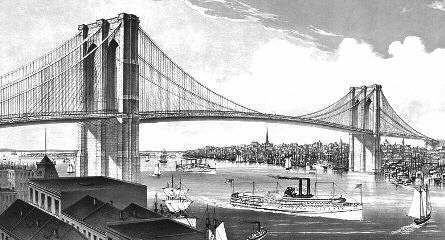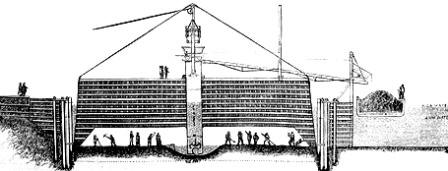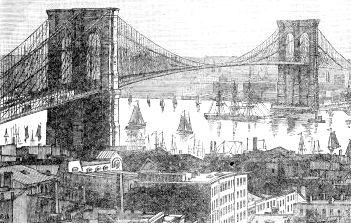
The Brooklyn Bridge
|
Fast Facts about the Brooklyn Bridge
Fast, fun facts about the Brooklyn Bridge:
Location: The City of New York, New York,
United StatesIt
connects the cities of New York (Manhattan)
and Brooklyn
Total length of Brooklyn Bridge is 5,989
feet (1825 m)
The Width of the Brooklyn Bridge is 85 feet
(26 m)
The Height of the Brooklyn Bridge is 276.5
ft (84.3 m)
Date it was opened: May 24, 1883
Name of the Designer: John Augustus Roebling
The
Brooklyn Bridge Fact Sheet for kids
Interesting, fun Brooklyn Bridge Facts for kids are detailed below. The
history of the building of the Brooklyn Bridge is told in
a factual sequence consisting of a series of unusual short facts
providing a simple method of relating the famous people and events
and the construction of this famous American landmark.
For additional facts refer to the
History of
Urbanization in America
Brooklyn
Bridge Facts for kids
Brooklyn Bridge Fact 1:
The estimated total cost of the
construction was $15 million dollars
Brooklyn Bridge Fact 2:
It took fourteen years to build the
Brooklyn Bridge and
required the labor of over 600 men.
Brooklyn Bridge Fact 3:
The construction crosses the river by
a single span of 1,595 feet suspended by four cables.
The cables are 15½ inches in diameter and each cable is
composed of 5,434 parallel steel wires.
Brooklyn Bridge Fact 4:
Length of each land span, 930 feet.
New York approach, 1,562½ feet. Brooklyn approach, 971
feet
Brooklyn Bridge Fact 5:
The Brooklyn Bridge was lighted at night by the United
States Illuminating Co. with 70 arc lights of 2,000
candle power each. The blue-white arc lights cost
$18,000, several thousand dollars less than the Edison
Company bid for supplying incandescent lamps. The arc
lights were the first use of electric light over a
river. The vast majority of houses were still lighted by
gaslight.
Brooklyn Bridge Fact 6:
The workers represented a variety of
trades including Engineers, Laborers, Blacksmiths,
Carpenters, Masons and Stonecutters, Riggers, and
Painters. The Blacksmiths, Masons and Stonecutters were
the highest paid workers earning $3.50 to $4.00 per day.
The laborers earned $1.75 per day.
Brooklyn Bridge Fact 7:
John A. Roebling, was the designer
who conceived the project and formulated the plan for
the Brooklyn Bridge. He
was aided by his son Washington A. Roebling, who
directed the work from its inception to its completion.
Brooklyn Bridge Fact 8:
The assistant engineers also played
an important role in the Brooklyn Bridge project. The names of the
assistant engineers were Charles C. Martin, Wilhelm Hildenbrand, Francis Collingwood, William H. Paine,
George W. McNulty, and Samuel R. Probasco.
Brooklyn Bridge Fact 9:
Other men who played an important,
but often forgotten, role in the construction project
were the foremen E.F. Farrington, Arthur V. Abbott,
William Van der Bosch, Charles Young and Harry Tupple
Brooklyn Bridge Fact 10:
A caisson is a protective, watertight
chamber used to carry out construction work under water.
Men worked in compressed air in these caissons under the
river. The following diagram shows a cross section of a
Brooklyn Bridge caisson.

The men who worked
on the construction were extremely brave working high up
on the suspended wires and in the depths of the
caissons.
Brooklyn Bridge Fact 11:
More than 30 men died during the
construction project, including the designer, John
Roebling
Brooklyn Bridge Fact 12:
John Roebling (1806 – 1869) started
design work in 1867. In 1869 his foot was crushed by an
arriving ferry. His toes were amputated but he developed
tetanus 24 days after the accident and died on July 22,
1869.
Brooklyn Bridge Fact 13:
Washington Augustus Roebling (1837 –
1926) became assistant engineer on the Brooklyn Bridge
in 1868, and was named chief engineer after his father's
death in 1869.
Brooklyn Bridge Fact 14:
Washington Roebling designed the 2
large pneumatic caissons that became the foundations for
the two towers.
Brooklyn Bridge Fact 15:
In 1870 fire broke out in one of the
caissons on the Brooklyn Bridge. Washington Roebling was fighting the fire in
the caisson. Working in the compressed air under the
river caused him to get decompression sickness (also
known as "the bends" or "caissons disease")
Brooklyn Bridge Fact 16:
Caissons Disease completely
incapacitated Washington Roebling. He suffered from
terrible joint pains, extreme tiredness and became
bedridden. He was unable to visit the construction site
again, but with the help of his wife, Emily, he directed
the project to successful completion in 1883.
Brooklyn Bridge Fact 17:
Mrs. Emily Warren Roebling (1843 –
1903) became known as the "first woman field engineer".
Emily was the only person allowed to visit Washington
and relayed messages and instructions to the site
engineers. She worked tirelessly on the project and
became an expert in its construction.
Brooklyn Bridge Fact 18:
The memories of the Roebling family
are still honored today by a plaque on the Brooklyn
Bridge dedicated to Emily,
her husband Washington, and her father-in-law John
Roebling
Brooklyn Bridge Fact 19:
The suspension construction contains
6,740 tons of material, and is able to sustain 7 times
its own weight. a tubular bridge for the same span would
contain ten times the weight of metal, and though
costing twice as much money
Brooklyn Bridge Fact 20:
On August 24, 1876, E.F. Farrington,
Master Mechanic of the Brooklyn Bridge, made the first
crossing across the East River on a wire.
Continued...
Brooklyn
Bridge Facts for kids
Brooklyn Bridge for
kids
The info about the opening of the Brooklyn Bridge provides interesting facts and
important information about this important event that occured during the presidency of the 21st President of the United States of America.
Brooklyn Bridge for kids: Timeline and Fact Sheet for kids
The history of Brooklyn Bridge is told in a factual sequence consisting of
a series of short facts providing a simple method of relating the
history and events of the Brooklyn Bridge.
Brooklyn
Bridge Facts for kids
Brooklyn Bridge Fact 21:
The opening of the Brooklyn Bridge was an extremely grand
affair that was held on May 24, 1883.
● It was known as
"The People's Day". The date chosen for the opening
coincided with the birthday of Queen Victoria.
● This
incensed Irish immigrants who did not want to appear to
celebrate anything to do with the British. Newspapers
reported that Irish-American nationalists they called
"Dynamite Patriots" would attempt to blow up the
construction.

Brooklyn Bridge Fact 22:
The Opening Ceremony: The buildings
in the town were draped with banners and flags of red,
white and blue. A procession of carriage with important
guest and politicians, including the president, paraded
through the streets of New York from Madison Square,
passing through Fifth Avenue and Broadway
Brooklyn Bridge Fact 23:
The Opening Ceremony: Most people
were given a holiday to celebrate the event and vendors
sold different types of memorabilia to commemorate the
event - commemorative medals and buttons were sold for
15 cents.
Brooklyn Bridge Fact 24:
Loud cannon fire accompanied
President Chester A. Arthur and Mayor Franklin Edson as
they crossed to the Brooklyn-side tower where they were
greeted by the Mayor of Brooklyn, Seth Low
Brooklyn Bridge Fact 25:
The official ceremony and speeches
were given under the arched roof of the great iron
terminal building. 6000 people crowded the area to hear
the speeches - that went on for hours!
Brooklyn Bridge Fact 26:
The Opening of the Brooklyn Bridge: The opening ceremonies
featured music by the 23d Regiment Band and the
7th Regiment Band. A prayer was offered by the Rt. Rev.
Bishop Littlejohn followed by a Presentation Address on
behalf of Trustees by William C. Kingsley, the
Vice-President.
Brooklyn Bridge Fact 27:
The Opening: Acceptance Addresses
were then made by Mayor Seth Low on behalf of the City
of Brooklyn, and by Mayor Franklin Edson on behalf of
the City of New York
Brooklyn Bridge Fact 28:
Thousands of people watched the
opening ceremonies which concluded in the evening with a
massive firework display.
Brooklyn Bridge Fact 29:
On the very first day it opened, 1800
vehicles crossed the bridge, consisting of horse-drawn
traffic, with a separate elevated walkway pedestrians
and bicycles.
Brooklyn Bridge Fact 30:
The major types of city transport at
the time were Streetcars,
Horse Cars,
horse drawn carriages, and trains. Now, 150,000 vehicles
make the crossing every day.
Brooklyn Bridge Fact 31:
The bridge-trains started
running in September. The trip across on the
bridge-train took five minutes and cost 5 cents. The
trains were two 300 horsepower steam engines. By 1885
the bridge-trains had carried over 20 million
passengers - many visited
Central Park.
Brooklyn Bridge Fact 32:
Just six days after the opening, on
May 30 1883 (Memorial Day), a widespread panic engulfed
the massive crowd and a rumor spread that the structure
was unstable and was going to collapse. The crowd
panicked, people were crushed and several were killed.
Brooklyn Bridge Fact 33:
To help quash doubts about the
stability of the structure, and promote his show, circus
owner P.T. Barnum organized a fantastic publicity stunt.
On May 17, 1884, Jumbo the Elephant led a parade of 21
elephants across the bridge.
Brooklyn Bridge Fact 34:
The initial charge to make the
Brooklyn Bridge crossing was one penny to cross by foot, 5 cents for a
horse and rider to cross and 10 cents for a horse and
wagon. The price charged for farm animals were 5 cents
per cow and 2 cents per hog or sheep
Brooklyn Bridge Fact 35:
Stunts: The two towers are 275 feet
above the water. The first person to jump off the bridge
was Robert E. Odlum, a swimming instructor, who died as
a result. He was the brother of the brother of women's
rights activist Charlotte Odlum Smith.
Brooklyn Bridge Fact 36:
Stunts: Steve Brodie jumped off and
survived on July 23, 1886 - his stunt made him into a
famous actor.
Brooklyn Bridge Fact 37:
A man made the leap wearing large
canvas wings, hoping he would be able to fly. He failed
to fly but sailed 1000 feet upstream and survived the
attempt
Brooklyn Bridge Fact 38:
Stunts: Stuntmen flew airplanes under
the structure in attempts to gain publicity for
companies and products.
Brooklyn Bridge Fact 39:
In 1944 the elevated trains stopped
running and the old iron terminals were pulled down
Brooklyn Bridge Fact 40:
The construction of the Brooklyn
Bridge was called one of
the wonders of the Industrial Revolution, a wonder of
science and was heralded as one of the greatest
engineering feats of all time
Brooklyn
Bridge Facts for kids
Brooklyn Bridge - President Chester Arthur Video
The article on the Brooklyn Bridge provides detailed facts and a summary of one of the important events during his presidential term in office. The following
Chester Arthur video will
give you additional important facts and dates about the political events experienced by the 21st American President whose presidency spanned from September 19, 1881 to March 4, 1885.
Brooklyn Bridge
●
Interesting Facts about Brooklyn Bridge for kids and schools
● Construction
of the Brooklyn Bridge
●
The Brooklyn Bridge, a major
event in US history
●
Chester Arthur Presidency September 19, 1881 to March 4, 1885
●
Fast, fun, interesting
facts
about the Brooklyn Bridge construction
●
Foreign & Domestic
policies of President Chester Arthur
● Chester Arthur Presidency and
facts about the Brooklyn Bridge for schools,
homework, kids and children
|